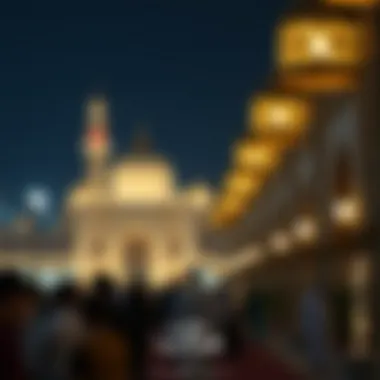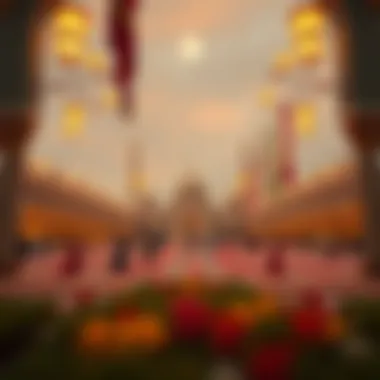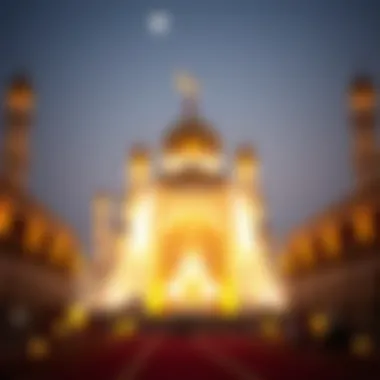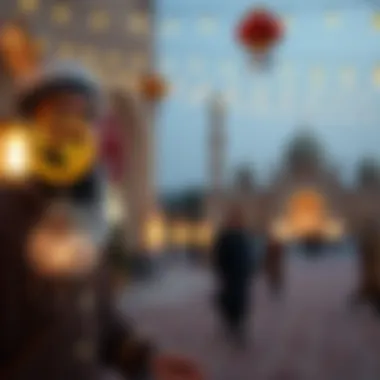Eid ul Adha Holiday in UAE 2023: Traditions and Impact


Intro
Eid ul Adha, one of the most significant celebrations in the Islamic calendar, holds a unique place in the hearts of millions in the UAE. As the holiday approaches in 2023, understanding its implications can be invaluable for companies, investors, and expatriates alike. This time of year resonates deeply within the UAE's diverse tapestry of cultures, where the traditional practices of sacrifice and communal gathering offer insights not only into cultural richness but also into economic rhythms.
The festivities span several days, bringing communities together under the banner of shared traditions. The holiday kicks off with prayers in mosques and open fields, followed by family gatherings that often feature sumptuous feasts, emphasizing generosity—a core value in Islamic teachings.
Why It Matters
Amidst all these activities, there’s an intricate dance of economic activity. For property investors and real estate agents, understanding how Eid ul Adha influences market directions can prove crucial. With increased footfalls in retail and significant restaurant bookings, one could see elevated demand in various sectors, particularly travel and hospitality.
This article endeavors to dissect the myriad implications that Eid ul Adha has across different horizons in the UAE, diving into property investment insights, community events, and the overall vibrancy of life during this blessed period.
Prelude to Eid ul Adha
Eid ul Adha, often regarded as the Festival of Sacrifice, holds a special place in the hearts of the Muslim community worldwide, and its significance echoes particularly in the diverse landscape of the UAE. Understanding this holiday is pivotal, not only for its spiritual resonance but also for its socio-economic implications. In this article, we will explore why this holiday matters tremendously across various facets of society, economy, and even the real estate market.
The insights gained from examining Eid ul Adha can benefit various stakeholders - from homebuyers looking to navigate seasonal fluctuations, to expatriates wishing to embrace local customs, and investors keen on optimizing their strategies around this specific time of year.
Historical Background
Eid ul Adha commemorates a profound narrative that dates back to the Quranic story of Prophet Ibrahim (Abraham), who was tested by God. According to tradition, Ibrahim was commanded to sacrifice his son, Isma'il (Ishmael), as an act of obedience. When he was about to fulfill this command, God provided a ram as a substitute for the sacrifice. This act of devotion illustrates themes of faith, submission, and communal bonding, which are particularly celebrated during this holiday.
The historical significance of Eid ul Adha is not merely about the ritualistic practices that are observed but also about reflecting on the ethos of sacrifice, compassion, and the importance of community support. This pastoral story is often echoed in UAE communities, where the distribution of meat to those in need underlines the holiday’s emphasis on charity. This continuity of tradition through centuries solidifies Eid ul Adha as more than a religious observance; it's a cultural touchstone that highlights the collective identity of families and communities.
Cultural Significance
Eid ul Adha isn't just a day of religious rites; it serves as a profound cultural celebration that fosters community cohesion in the UAE. As families and friends gather, it highlights a tapestry of cultural expressions, from the multi-faceted ways in which meals are prepared and shared, to the joyful exchanges of gifts that take place.
The holiday prompts countless households to cook traditional dishes, often infused with flavors that represent various Emirati and expatriate communities. This culinary exchange brings people together, allowing for the sharing of diverse traditions and flavors. For instance, you might find a plate of Mandi next to a serving of Samosas, showcasing the blend of culinary practices from different cultures.
Moreover, Eid ul Adha functions as a reminder of social responsibilities. Through acts of charity, individuals are encouraged to offer their blessings to those less fortunate. This spirit underpins the very fabric of UAE society and speaks volumes about how the holiday transcends personal enjoyment, aiming for collective upliftment. The sense of belonging that emerges during this time is a vital aspect of the cultural narrative.
"Eid ul Adha teaches us that the essence of sacrifice is not just about what one gives up, but rather what one gains in spirit and community."
With a deep-rooted emphasis on sharing and support, Eid ul Adha emerges as a cornerstone of harmony and mutual aid in the UAE landscape, ultimately enriching the lives of residents, whether they are locals or expatriates. Understanding these layers of historical and cultural significance can illuminate the unique ways in which the holiday unfolds within the region.
Eid ul Adha in the UAE
Eid ul Adha holds a significant place in the UAE’s cultural and social fabric. It symbolizes sacrifice, generosity, and community spirit, resonating deeply with both citizens and residents alike. Understanding how this festive occasion is celebrated and its broader implications provides valuable insights into life in the UAE, making it essential for homebuyers, investors, real estate agents, expatriates, and property managers to be culturally aware.
Public Holiday Announcement
The announcement of public holidays in the UAE often comes from the Ministry of Human Resources and Emiratisation. As Eid ul Adha approaches, many people eagerly await official news about the holiday dates. Typically, preparations begin well in advance, with businesses and schools making arrangements to accommodate the time off. Words like "Eid holidays" circulate through social media and community gatherings, building excitement.
This announcement is not merely a calendar note; it significantly impacts the daily lives of residents. It provides an opportunity for individuals to reconnect with their families and consider their obligations toward charity or Zakat al-Adha, which reflects one of the holiday’s core values. Knowing when the public holiday falls allows families to plan their travels or any planned activities, thus enhancing their connection to traditions.
Duration and Dates in


In 2023, Eid ul Adha is expected to be observed around June 27, but official confirmation is often pending based on lunar sightings. The holiday spans several days, typically giving people an extended break that can range from four to six days. As these dates approach, many make arrangements for travel, as it is a prime time for family reunions and Umrah visits.
The duration not only facilitates individual celebrations but also boosts various sectors of the economy. As families gather for feasts and make plans for festive outings or vacations within the region, sectors like retail and tourism experience increased activity.
With societal trends leaning toward communal celebrations and family gatherings, these dates harbor prime significance in local consciousness, making them a cornerstone of expatriate life and what many view as an essential aspect of being part of the UAE community.
The long-awaited announcement of public holidays resonates deeply with the spirit of this festive season, emphasizing unity and cultural continuity.
Thus, understanding the intricacies surrounding Eid ul Adha is paramount for anyone engaging with the UAE, be it in personal or professional realms.
Celebration Practices
Celebration practices during Eid ul Adha in the UAE offer a rich tapestry of cultural significance, blending various traditions that enhance community bonds and personal relationships. This section will explore the key elements of how these celebrations unfold, from religious observances to family gatherings, and highlight their broader implications in the context of the UAE's unique demographic landscape.
Religious Observances
Religious observances are the cornerstone of Eid ul Adha celebrations. On this day, families begin their morning with prayer in mosques and open grounds, emphasizing the communal aspect of worship. The significance of these prayers lies in not just fulfilling a religious duty but also in fostering a sense of unity among diverse communities.
It is common for families to don new or their best attire, signifying respect and reverence for the occasion. Following the prayers, the act of Qurbani—sacrificing an animal—takes place, which is a pivotal point of the holiday. This tradition serves multiple purposes. Firstly, it commemorates the willingness of Ibrahim (Abraham) to sacrifice his son in obedience to God. Secondly, it emphasizes charity; the meat from the sacrificed animal is often distributed among family, friends, and the less fortunate. This act reinforces social bonds and ensures that everyone shares in the blessings of this festive occasion.
Family Gatherings and Feasts
Family gatherings during Eid ul Adha are akin to a warm embrace, where members come together to celebrate life and share joy. One prominent aspect of these gatherings is the feast that follows the prayers. Meals are replete with traditional dishes that not only satiate hunger but also reflect the rich culinary heritage of the region.
Traditional Dishes
Traditional dishes served during Eid ul Adha are a feast for the senses. Items like Mandi, a fragrant rice dish often served with marinated and roasted lamb or chicken, stand out. The distinct aroma of spices like saffron and cardamom wafts through homes, creating an inviting atmosphere.
Furthermore, each family often has its secret recipes, which they pass down through generations. This practice not only preserves culinary traditions but also adds a personal touch to the feast, making it unique. Sharing these meals strengthens family ties and promotes a sense of belonging, which is particularly important in a multicultural setting like the UAE.
Gift Exchanges
Gift exchanges during Eid ul Adha play an essential role in enhancing familial relationships and ties with friends. Children look forward to receiving Eidi, which are gifts or money given to them by elders. This tradition serves as a way to honor the younger generation and make them feel included in the joyous occasion.
More than just material gifts, these exchanges symbolize thoughtfulness and care. Choosing the right gift often reflects the giver's understanding of the recipient's preferences, which nurtures stronger relationships. The act of giving fosters a spirit of gratitude, reinforcing the community's fabric and reminding all of the importance of generosity.
Community Events
Community events during Eid ul Adha further enrich the celebratory atmosphere, showcasing the UAE's commitment to inclusion. Local councils and organizations often host public festivities, including fairs, cultural showcases, and competitions, allowing for a communal celebration that transcends individual family gatherings.
These events not only provide entertainment but also promote cultural exchange among the diverse populations residing in the UAE. By participating in such communal activities, residents, both locals and expatriates, foster a greater understanding and appreciation of each other's traditions, thereby enhancing social cohesion.
In summary, the celebration practices during Eid ul Adha in the UAE reflect deep-rooted traditions that contribute significantly to family bonds and community spirit. They provide an opportunity for personal connections and social unity in a diverse society, making the holiday a vital part of Emirati culture and identity.
Economic Impact of Eid ul Adha
The economic impact of Eid ul Adha in the UAE is a significant area of focus, particularly as this holiday does not just celebrate religious devotion but also stimulates various sectors that are crucial for the local economy. Understanding this influence helps investors, businesses, and individuals navigate the festive period effectively. The heightened consumer activity during Eid swells the retail and tourism sectors, creating a vibrant atmosphere that also resonates in the real estate market.


Retail and Tourism Sector
Eid ul Adha brings a wave of spending that uplifts the retail and tourism industries. Shoppers flock to malls, markets, and local boutiques seeking gifts, clothing, and traditional items associated with the festival. Specialty stores often experience a surge in customers, particularly those offering traditional foods or festive decorations. Such demand results in price adjustments, special promotions, and extended operating hours, which contribute significantly to the revenue generated during this period.
Tourism also sees a noticeable uptick; expatriates and tourists alike take the opportunity to explore iconic sites, enjoy cultural experiences, and indulge in the local cuisine. Hotels and restaurants become hot spots, offering tailored experiences for families looking to celebrate together. It's common to see restaurants modify their menus to include festive dishes, drawing in both locals and visitors.
Effects on the Real Estate Market
Short-term Rental Trends
During Eid, short-term rentals soar in popularity, especially in cities with a sizable expatriate population. Many families opt for these accommodations to host relatives or friends who visit for the holiday. Platforms like Airbnb and Vrbo report increased bookings, particularly in prime locations, showcasing how rentals provide flexible accommodation options. This flexibility is crucial because of the diverse needs of travelers, from large family groups to those seeking more intimate settings.
However, while this trend boosts rental income, it necessitates careful management of the property's condition and adherence to local regulations. Property managers face challenges in maintaining cleanliness and availability during this busy season, making operational efficiency vital for maximizing profit.
Market Activity During the Holiday
Market activity during Eid ul Adha also takes center stage as business owners brace for crowded shops and ample inquiries. The intermingling of local and foreign visitors means markets are buzzing with diverse spending habits—some focusing on luxury items while others seek cost-effective options.
Interestingly, real estate agents often notice a spike in inquiries related to both short-term lease opportunities and potential long-term investments during this holiday. Prospective buyers may feel compelled to secure properties due to the festive spirit, making connection with real estate professionals imperative for navigating this crowded marketplace. Understanding buyer psychology during such a culturally significant period is an advantage for agents and investors alike.
Travel Considerations During Eid
Travel during Eid ul Adha in the UAE presents a unique tapestry of cultural vibrance and practical considerations. As one of the most significant holidays in the Islamic calendar, it draws travelers from various walks of life. Whether you are a local resident or a visitor, understanding the nuances of travel during this period can greatly enhance your experience and facilitate smoother logistics.
Increased Travel Demand
With Eid ul Adha, there’s a noticeable upswing in travel activity. Families often seek to reunite with relatives, and many expatriates take this opportunity to explore nearby destinations. Well over half a million people might choose to travel during this holiday, making it essential to plan ahead.
During this period, air traffic soars. Popular holiday spots, both local and regional, will witness a spike in bookings. Consequently, securing flights and accommodation early on can be a challenge. Prices can also balloon as demand increases, leaving last-minute travelers in a bind.
In light of this burgeoning travel demand, it becomes imperative for individuals to consider off-peak times for travel. Flights in the early hours or late at night might be less crowded and potentially cheaper, providing both comfort and savings. Additionally, being aware of the local customs and traffic patterns will contribute to more efficient travel during this bustling time.
Transport and Accommodation
Traveling around during Eid requires an understanding of public transport dynamics and the accommodation landscape.
Airport Operations
Airport operations during Eid ul Adha are typically heightened. Major airports like Dubai International Airport and Abu Dhabi International see a flurry of activity. Key characteristics include extended operational hours and increased staff during peak travel times. This is essential to accommodate the influx of travelers and maintain smooth operations.
The unique feature of these airports during this holiday is the special arrangements made for expedited processing. Assistance points and designated prayer areas are often set up, aiming to enhance the travel experience. While these enhancements greatly benefit travelers, delays in security checks can still happen. Thus, arriving early becomes a prudent suggestion to avoid the last-minute rush.
Hotel Availability
Hotel availability during Eid can be a mixed bag. Popular destinations can book up rapidly, often months in advance. Hotels typically offer promotional packages to entice guests, which can include discounts or free meals during the holiday. This makes holiday stays a more enticing option for those looking to celebrate in style.
However, as appealing as these offers can be, the influx often leads to a shortage of rooms. Finding availability, especially in budget-friendly accommodations, can be challenging as the dates approach. Prioritizing reservations through travel platforms can provide clarity on options and pricing well ahead of time.


Booking early not only secures a place to stay but also opens up opportunities for early-bird deals that can save travelers significant amounts. Plus, it ensures a stress-free arrival.
"Pre-planning for Eid travel can mean the difference between a joyous gathering and a chaotic scramble."
By staying informed and planning appropriately, travelers can navigate the holiday period with a greater understanding of the dynamics at play. Through mindfulness of these practicalities, individuals can foster a more enriching travel experience during Eid ul Adha.
Social Dynamics in the UAE During Eid
Eid ul Adha is not just a holiday marked on the calendar; it's a mosaic of social interaction that stirs the heart of communities across the UAE. This period emphasizes shared experiences that bind individuals together, a critical aspect of the social fabric in a nation recognized for its cultural diversity. The significance of the social dynamics during Eid can’t be underestimated. It enhances social cohesion, reinforces community bonds, and fosters an environment that celebrates diversity and inclusion.
Community Cohesion
During Eid, there's an observable transformation in how people interact. Neighbors and friends come together, often blending cultures and traditions. The act of giving is central to the celebrations. People participate in the practice of Qurbani, or the ritual sacrifice, which not only underlines the religious significance but also ensures the sharing of meat with those less fortunate.
This act of generosity fosters a sense of community. We can see long queues at butcher shops ahead of the festival, not just for personal loss but for community contributions. Families often gather to celebrate, reinforcing connections that might be otherwise overlooked amid the daily hustle and bustle of life in this vibrant metropolis.
Moreover, local events during Eid, such as fairs and public celebrations, provide an informal medium for community bonding. Markets pop up in various neighborhoods, showcasing local goods and delicacies, adding to the festive atmosphere and enhancing communal experiences. The excitement in the air is palpable; it’s a time when people forget their daily grievances and embrace their shared humanity, regardless of their backgrounds.
"Eid is a reminder that our commonalities are stronger than our differences, where compassion flows as freely as the festive spirit."
Diversity and Inclusion
Eid ul Adha in the UAE beautifully encapsulates the essence of diversity. People from myriad nationalities come together to commemorate a significant religious event, each adding their personal touch to the celebration. This amalgamation of cultures brings about a rich tapestry of traditions, making the holiday vibrant and multifaceted.
The UAE, home to residents from over 200 nationalities, highlights the importance of inclusion during Eid. Various expatriate communities showcase their traditional customs alongside the Emirati practices, transforming public squares and city parks into a mini-global village. This harmonizing of traditions enriches everyone's experience, inviting residents to partake in global celebrations.
In commercial spaces, stores often adapt their offerings to cater to a diverse audience, stocking traditional dishes from various cultures, catering not just to local tastes but also to that of expatriates, ensuring everyone feels represented during this festive time.
When residents open their homes for familial gatherings, it reflects not only hospitality but also a willingness to include others in their celebration—friends, colleagues, or even new acquaintances. Such acts underscore the inclusivity ethos that the UAE strives to promote, a necessary pillar for fostering communal ties in an ever-evolving social landscape.
For individuals considering investment or relocation to the UAE, understanding these social dynamics is essential. It gives insight into how community ties can influence lifestyle and living arrangements here, where Eid ul Adha illuminates the positive aspects of communal living amidst diversity.
Epilogue
Eid ul Adha represents more than just a holiday; it's a cornerstone of community spirit and a reflection of cultural values in the UAE. The importance of this topic lies not only in the celebrations and gatherings but also in the economic and social ramifications that arise during this period. Understanding these elements can significantly benefit various stakeholders, from homebuyers to real estate investors, providing a clearer picture of the market dynamics.
The Long-term Significance of Eid ul Adha
Eid ul Adha is a time of giving, reflection, and community bonding. Its long-term significance can be observed in several ways:
- Cultural Preservation: As traditions pass down through generations, they strengthen cultural heritage.
- Economic Boost: The holiday stimulates various sectors, particularly retail and hospitality. For instance, the surge in dining out and festive shopping can enhance the local economy, benefitting businesses and employees alike.
- Social Unity: In a diverse nation like the UAE, Eid ul Adha plays a crucial role in promoting social cohesion. It fosters an environment where expatriates and locals can celebrate together, bridging cultural divides.
Such elements underscore the holiday’s role as a dynamic force, impacting lives beyond the immediate festivities.
Future Trends and Observations
Looking ahead, several trends are likely to shape the way Eid ul Adha is celebrated in the UAE:
- Digital Transformation: As technology integrates further into daily life, online platforms for shopping and community engagement will grow, making it easier to connect and celebrate from a distance.
- Sustainability Focus: Increasing awareness of environmental impacts may lead to more eco-friendly celebrations, influencing the choice of gifts, food waste management, and community event planning.
- Cultural Exchange: The UAE’s global position continues to attract a more diverse population, leading to unique intercultural exchanges during Eid. Expect an infusion of new practices and traditions, enriching the festival.
"Understanding the adaptive nature of cultural celebrations gives us insight into the ever-evolving landscape of community life in the UAE."
In summary, Eid ul Adha serves as a multifaceted event that impacts economic, social, and cultural dimensions in the UAE. For homebuyers, investors, real estate agents, expatriates, and property managers, comprehending these dynamics is essential for navigating this vibrant period. As the celebration unfolds each year, its significance becomes more pronounced, shaping the future of the community and economy alike.
Relevant resources for more information include Wikipedia - Eid ul Adha, and Britannica - Eid ul Adha.
For real-time discussions, platforms like Reddit and Facebook provide a glimpse into local celebrations and perspectives.

